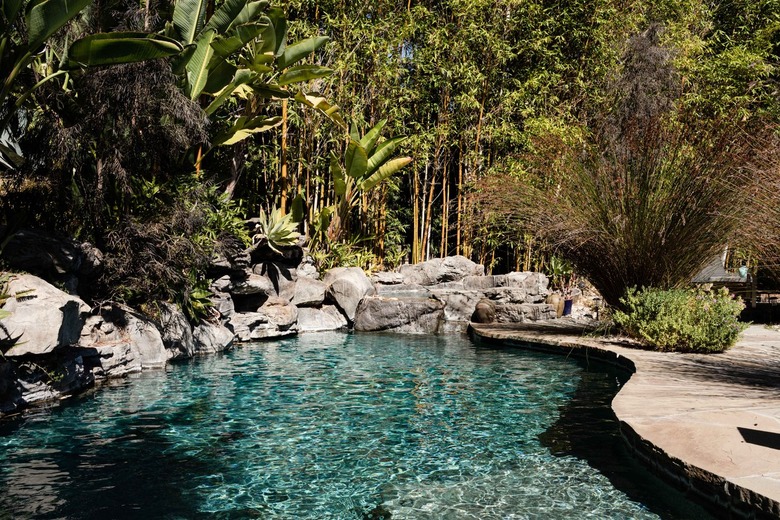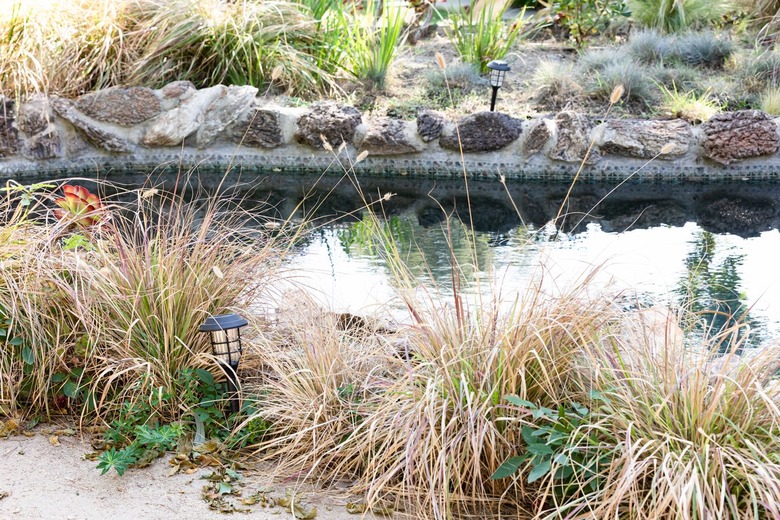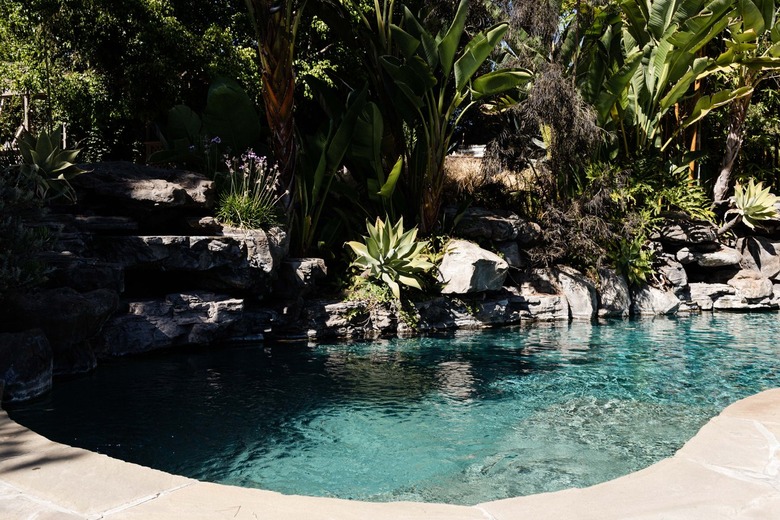7 Things To Consider Before Installing A Pool This Summer
We may receive a commission on purchases made from links.
You have a dream: Instead of hunkering down inside your air-conditioned house to wait out the hot summer weather — or escaping to the beach — you put on a swimsuit and head out to the backyard swimming pool. The neighbors join you, and with kids splashing in the water and the grill churning out dinner, you revel in your stay-at-home tropical paradise. Or maybe you're the type who likes to visualize a swimming pool as a year-round backyard water retreat that blends seamlessly with a lush garden and impeccably manicured landscaping.
Whatever your preferred pool daydream, realize that it will be a bit like bringing home a new pet. Unlike other home improvements, such as decks, patios and extra rooms, a swimming pool is alive, and it needs daily TLC as much as a pet needs food. That's just one of the reality checks you face as you consider pool ownership, and there are more: You'll probably find yourself jumping through bureaucratic hoops you didn't expect and doing a lot more building than you realized was necessary, and all of this, along with pool maintenance, could cost more than you imagined.
To make things simpler and less expensive, you may be willing to forego the idea of an in-ground pool in favor of an above-ground one or even a stock tank pool for the hot summer months. That will save you from having to scour through the list of local pool contractors because you can often erect an above-ground pool with the help of friends. Whether you choose an in-ground or above-ground pool, however, the pool is going to occupy a significant share of outdoor real estate and have a lasting impact on your home as well as the neighborhood, so it's important to consider these seven factors as you plan.
1. A Swimming Pool Can Be Costly
1. A Swimming Pool Can Be Costly
Unless you just won the lottery, pool cost will probably be one of the first things on your mind. Many homeowners install pools hoping to recoup costs when the home sells, but that's often a pipe dream. The most you can expect the value of your home to increase is about 7 percent, and that's only if the pool is in immaculate shape. An older, poorly maintained pool can actually lower your home's value.
The average upfront cost to install a new in-ground pool ranges from $37,000 to $60,000 depending on whether the lining is vinyl (which adds the least to home value and needs the most maintenance), fiberglass (fiberglass pools are easily damaged) or concrete or a concrete-like material, such as gunite. That's the base cost for a rectangular 12 x 24-foot pool without any extras, such as pool decking, landscape additions or amenities, such as a saltwater chlorinator or heater. The final cost for a pool with all the bells and whistles can easily top $100,000. An oval or round pool costs about the same as a rectangular one, but there will be an additional price bump if you want a freeform pool shape.
An above-ground pool, which is typically smaller but a lot less expensive, emerges as an alternative. On average, homeowners can install one themselves for as little as $2,500, not including decking, fencing and other safety equipment, and they're easy to get. You can buy one at Walmart or Amazon. Even a top-end, professionally installed above-ground pool will set you back about half as much as the least expensive in-ground pool — about $14,000.
2. A Pool Needs Ongoing Maintenance
2. A Pool Needs Ongoing Maintenance
If a pool doesn't get regular maintenance, the water turns cloudy, and as microorganisms begin to take over, it can turn a number of bilious hues, from green to orange to brown. Keeping your pool water clear isn't as simple as just adding more sanitizing agent, which may be chlorine, bromine, ozone, salt, UV light or a copper compound, such as Pristine Blue. You also have to monitor pH and total alkalinity and adjust them when they go out of balance or else the sanitizer won't work. In addition to regular maintenance, most conventional pools need occasional shocking with a large amount of sanitizer after heavy use or a period of heavy rain.
If you have enough room in your yard for one, a natural swimming pool needs the least amount of traditional pool maintenance, but because it uses filters and plants to keep the water clean, it requires gardening. No matter how you slice it, you have to set aside time and money for maintenance if you plan to have a pool.
3. There Are Safety Requirements
3. There Are Safety Requirements
The 2018 International Residential Code, which governs standards for all household building projects, has an entire chapter on swimming pools, and some states have additional standards, one of the most stringent being California. If you are part of a homeowners' association, the association may impose even more safety and cosmetic requirements. In addition, you will need to obtain a permit from the city to install a swimming pool, and this includes an inspection to ensure your pool complies with all applicable requirements.
Common safety requirements include fencing, lockable gates and alarms that sound when the gate opens. If you build the pool close enough to the house for access through a patio door, the access door may also need to have an alarm. Any decking you install around an above-ground pool should also have a fence and some means of preventing access when the pool isn't in use, such as a removable stairway.
It's important to contact your insurance company and inform it of your plan to build a pool. It will probably result in higher premiums, and the insurance company may require safety measures beyond those required by local law.
4. A Swimming Pool Needs to Fit In
4. A Swimming Pool Needs to Fit In
The best pool is one that fits with the overall landscape design, not only in the owner's own backyard but also in those of the neighboring properties. You can modify the landscaping on your property to accommodate a new pool, but you can't do anything about the neighboring ones. A standard pool for swimming laps might not be the best choice for a property surrounded by tall, sun-blocking trees growing on surrounding properties, and a more decorative one might add more to the outdoor living space.
A pool design can range from purely utilitarian at one extreme to purely decorative at the other, and the emphasis varies according to how you want to use it. A rectangular pool is best for those who just like to do laps. A freeform shape that includes a waterfall or fountain, on the other hand, can turn the pool into a water feature that enhances the home's aesthetic profile. It might actually increase the home's value, especially if you install a hot tub along with the pool. Nearly half of the real estate agents in the Pacific Northwest consider water features and hot tubs to be top upgrades, but pools by themselves? Not so much.
5. You May Need Landscaping Upgrades
5. You May Need Landscaping Upgrades
An in-ground pool needs to be situated on level ground, and water must drain away from it. If your backyard is sloped, you may have to bring in some heavy machinery to level the ground, which adds to the upfront costs of pool building, but it's a critical consideration. Failure to consider drainage can be disastrous, especially if you have freezing winters during which high groundwater can freeze and crack concrete pools.
If your backyard is a blank slate when it comes to landscaping design, the need to level the ground and move around earth can be a blessing in disguise. It provides the opportunity to improve the quality of your outdoor space while at the same time making improvements that matter to prospective homebuyers. You might consider going all out and including a patio, waterfall, outdoor sitting area or even an outdoor kitchen as part of your pool project.
6. A Cool Pool Saves Energy
6. A Cool Pool Saves Energy
The amount of energy used by a single-speed pool pump is second only to that consumed by a home's air conditioner, and if you run it for eight hours a day and live in Florida, where electricity costs only $0.10 per kilowatt-hour, you'll pay an average of $30 a month to run the pump. Triple that expenditure if you live in California. You can cut energy costs by a third if you install a two-speed pump and by two-thirds if you opt for a variable-speed pump.
Every pool needs a circulation pump to filter the water — even a natural pool with a plant filtration system — but heaters are optional, and if you're even slightly taken aback by the cost of running a pump, the cost of operating a heater will make your hair stand on end. Running the most efficient type of pool heater — a heat pump — costs $120 to $200 per month, a gas heater costs $200 to $850 per month (depending on whether it uses natural gas or propane) and an electric heater costs $175 to $600. As you would expect, solar heaters cost hardly anything to operate, but they often require expensive setups and, of course, they only work if you get enough direct sunlight.
You could decide not to install a heater and rely on solar pool covers to warm the water and keep it warm. If heated pool water is part of your preferred picture, however, don't overdo it; a pool isn't a bathtub. Keeping the temperature just a few degrees above the ambient temperature makes for a refreshing swim. It will reduce your operating costs and help control algae, which aren't as prolific in cool water.
7. You May Have Unexpected Visitors
7. You May Have Unexpected Visitors
Depending on the type of fencing or other safety barrier you use around your pool, you may have nocturnal visitors of the four-footed variety, and it isn't unusual for one of them to fall in. Deer have sharp hooves that can rip a vinyl liner like it's a plastic bag. Ducks and geese may mistake your pool for a woodland pond and take up residence and raise their young.
Barriers are required to be kidproof, and if yours isn't, you may have two-footed visitors, and you could be liable if one of them has an accident, even if you didn't know they were there. That's one reason pool building is a job you should entrust to a reputable pool company and why you should shop around if you're transitioning from pool planning to pool construction. Kids are creative and can often find ways to breach barriers meant to keep them out, but a trusted pool contractor with years of experience will be one step ahead of them and can prevent your dream from turning into a nightmare.
References
- LawnStarter: Pricing Guide: How Much Does an Above-Ground Pool Cost?
- HomeLight: How Much Does it Cost to Install a Pool Now That Everyone Wants One?
- Florida Power & Light Company: Ask the Expert: How to Reduce the Costs of Running a Pool
- HomeAdvisor: Remodeling Tips to Consider When Installing a Pool
- Intec America: 9 Healthier Alternatives to Chlorine for Swimming Pools


